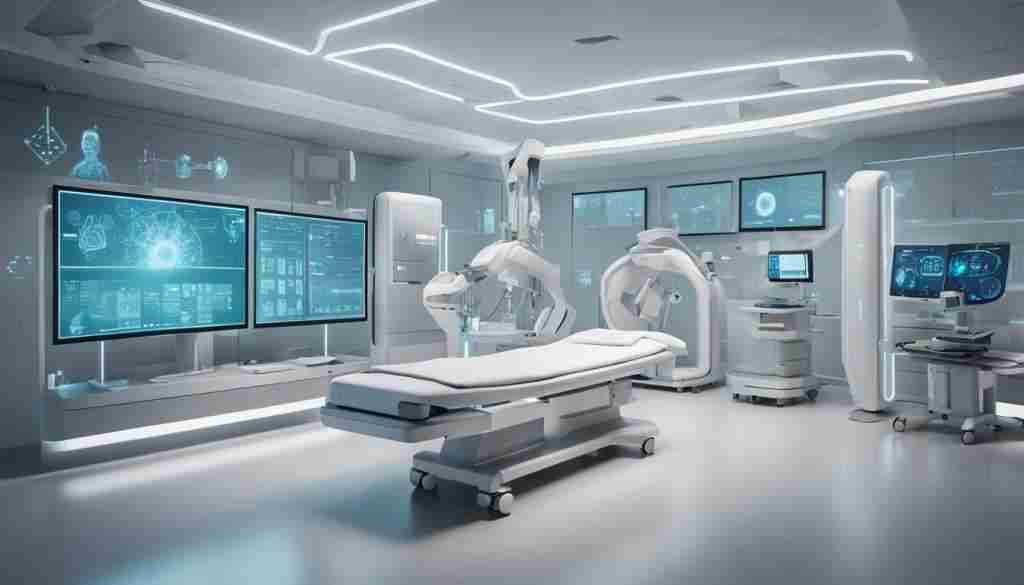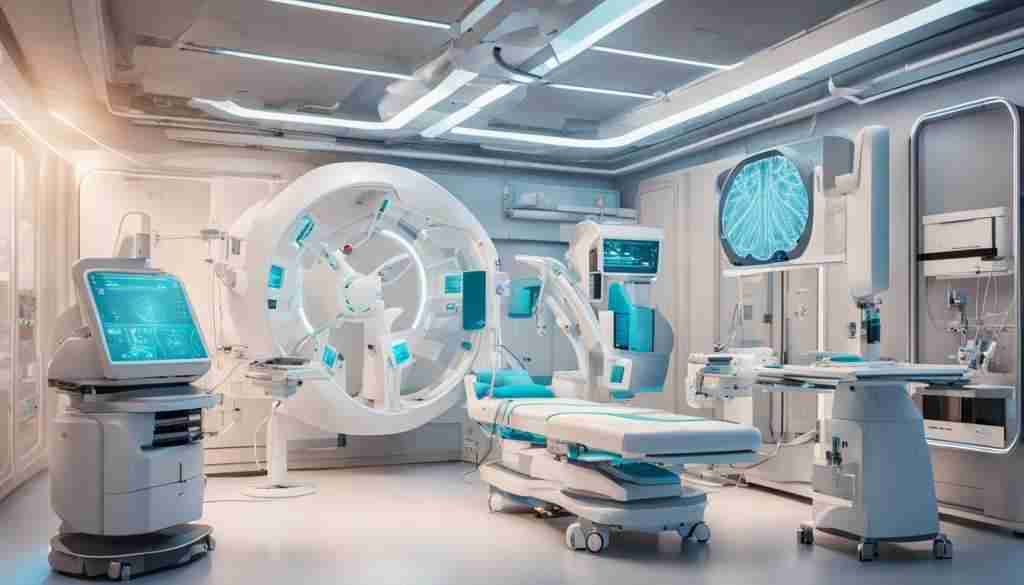Artificial Intelligence (AI) is revolutionizing the healthcare industry, providing new ways to improve patient outcomes and enhance healthcare delivery. From aiding in diagnostics to predicting disease outbreaks, AI is rapidly transforming the way healthcare is practiced.
In this article, we’ll explore how AI is being utilized to improve healthcare outcomes across various settings and patient populations. We’ll also delve into the challenges and ethical considerations associated with integrating advanced technology like AI into healthcare.
Key Takeaways:
- AI has the potential to significantly improve healthcare outcomes.
- An increasing number of AI solutions are being developed for healthcare applications.
- There are unique challenges and ethical considerations associated with integrating AI into healthcare.
AI’s Impact on Patient Outcomes
Artificial Intelligence (AI) has tremendous potential to transform patient outcomes in healthcare. AI applications can help healthcare providers make more informed decisions, leading to better patient outcomes. By leveraging AI technology, healthcare providers can identify potential health risks early, personalize treatments, and optimize patient care. In this section, we will explore how AI is being used to improve patient outcomes and transform the healthcare industry.
Enhanced Medical Diagnostics
AI is revolutionizing the way medical diagnoses are made. With the ability to crunch large volumes of medical data in seconds, AI algorithms can identify patterns and make predictions that humans may not be able to detect. For example, AI-powered diagnostic tools can analyze medical images, such as X-rays and MRIs, and detect anomalies with high accuracy. This can lead to earlier detection of diseases and better treatment outcomes.
| AI-powered diagnostics benefits: | AI-powered diagnostics drawbacks: |
|---|---|
|
|
Despite these drawbacks, the use of AI-powered diagnostics can lead to better patient outcomes and improved healthcare delivery.
Personalized Treatment Plans
AI can also be used to develop personalized treatment plans that cater to individual patient needs. By analyzing patient data, including medical history, genetic information, and lifestyle factors, AI algorithms can create customized treatment plans that are more effective than a one-size-fits-all approach. This can lead to better patient outcomes and reduced healthcare costs.
“AI algorithms can create customized treatment plans that are more effective than a one-size-fits-all approach.”
Optimized Patient Care
AI-powered technology can optimize patient care by providing healthcare providers with real-time data insights. For example, AI-powered chatbots can provide patients with personalized health advice and triage services, reducing the burden on healthcare providers andAI applications can help healthcare providersich uses AI-powered tools to facilitate remote consultations, can also improve healthcare access for patients in remote or underserved areas.
Overall, AI’s impact on patient outcomes in healthcare is undeniable. By leveraging AI technology, healthcare providers can improve diagnoses, personalize treatments, and optimize patient care, leading to better patient outcomes and a more efficient healthcare system.

Enhancing Healthcare Delivery with AI Solutions
Artificial Intelligence (AI) solutions have the potential to revolutionize healthcare delivery, making it more efficient and effective. By using AI technology, healthcare professionals can streamline their processes and make better decisions for their patients.
One of the key benefits of AI in healthcare is its ability to help healthcare professionals make faster and more accurate diagnoses. AI-powered diagnostic tools can quickly analyze patient data and identify potential health problems, allowing doctors to develop treatment plans more quickly. For example, AI-powered imaging tools can help radiologists detect tumors or other abnormalities in medical images.
AI can also improve patient care by enabling personalized treatment plans. By analyzing data on a patient’s medical history, lifestyle, and genetics, AI algorithms can suggest personalized treatment options that are tailored to the patient’s unique needs. This can help doctors make more informed decisions and provide better care to their patients.
The benefits of AI are not limited to hospitals and clinics. Telemedicine, which allows patients to receive medical care remotely, can also benefit from AI solutions. AI-powered chatbots can help patients get basic medical advice and answer common questions, freeing up healthcare professionals to focus on more complex cases. AI-powered wearables can also help patients monitor their health remotely, alerting them and their healthcare providers to potential health problems before they become serious.
While AI offers many benefits to healthcare delivery, there are also challenges and ethical considerations that need to be addressed. For example, there is a risk of data breaches and cyber threats, which could compromise patient privacy and security. There is also a risk of bias in AI algorithms, which could lead to unfair treatment of certain patient groups.
To overcome these challenges and ensure that AI is used ethically in healthcare, it is important to have strong regulations and guidelines in place. Healthcare organizations must work together to develop best practices for using AI solutions that prioritize patient privacy and security. They must also ensure that AI algorithms are designed to be unbiased and fair, and that they are regularly audited and updated to reflect changes in the healthcare landscape.

The use of AI solutions in healthcare is still in its early stages, but it has the potential to transform the way that healthcare is delivered. By using AI technology to improve patient care, healthcare professionals can make better decisions and provide more personalized treatment options to their patients. However, it is important to approach the use of AI in healthcare with caution and ensure that it is used ethically and responsibly.
Leveraging AI Technology for Improved Patient Care
Artificial intelligence technology is being increasingly used in healthcare settings to improve patient care. From diagnosing diseases to developing personalized treatment plans, AI is revolutionizing the way healthcare professionals approach patient care.
One of the ways AI is being leveraged for better patient care is through predictive analytics. Machine learning algorithms can analyze patient data to identify patterns, which can help healthcare professionals predict which patients are at a higher risk of developing a particular disease or condition. This allows for early intervention and treatment, ultimately leading to better outcomes.
Another application of AI technology in healthcare is through diagnostic imaging. AI algorithms can analyze medical images and identify abnormalities that may be missed by human radiologists. This technology can help improve the accuracy of diagnoses, resulting in more effective treatment plans.
Personalized medicine is another area where AI technology is being utilized to improve patient care. By analyzing patient data, including genetic information and medical history, AI algorithms can help healthcare professionals develop individualized treatment plans tailored to each patient’s unique needs. This can lead to more effective treatments with fewer side effects.
AI technology is also being used to improve medication adherence among patients. By analyzing patient data and behavior patterns, AI algorithms can identify patients who may be at risk of non-adherence and provide personalized interventions to improve compliance. This can ultimately lead to better treatment outcomes.

Overall, AI technology has the potential to significantly improve patient care in healthcare settings. By utilizing predictive analytics, diagnostic imaging, personalized medicine, and medication adherence interventions, healthcare professionals can provide better outcomes for their patients.
Overcoming Challenges and Ethical Considerations
The integration of advanced technology, including artificial intelligence, into healthcare delivery has enormous potential to improve patient outcomes and enhance the quality of care provided. However, this introduction of new technology also comes with significant challenges and ethical considerations that need to be addressed.
One of the major challenges is ensuring data privacy and security. With increased usage of digital health tools and patient data, it is imperative that healthcare organizations prioritize safeguarding patient information and adhere to strict security measures to prevent data breaches. Additionally, there is a concern over algorithmic bias, where AI technology may perpetuate existing social inequalities by reflecting historical biases in healthcare data.
Another challenge is the potential displacement of healthcare professionals. As AI is introduced to perform tasks that were once performed by humans, there is a need to ensure that healthcare workers are not left behind and that innovative training programs are put in place to equip them with the skills necessary to adapt to these new technologies.
Moreover, the ethical considerations of AI in healthcare must be taken into account. There is a need for transparency in how algorithms are being developed and used, and for ensuring that the benefits of AI are distributed equitably across all populations, including disadvantaged groups.
Nonetheless, with careful consideration of these challenges and ethical considerations, the integration of advanced technology, including AI, can offer enormous benefits in improving healthcare outcomes and delivering better patient care. To realize the full potential of advanced technology for better healthcare outcomes, it is crucial that healthcare organizations prioritize the integration of AI, while ensuring ethical implementation and addressing challenges that may arise.

Conclusion
In conclusion, the potential of improving healthcare outcomes with artificial intelligence is vast. As we have discussed in this article, AI technology is transforming patient outcomes, enhancing healthcare delivery, and improving patient care. By leveraging AI technology, we can diagnose diseases more accurately, develop personalized treatment plans, and improve medication adherence.
However, as with any advanced technology, there are challenges and ethical considerations that need to be addressed. Concerns related to data privacy, bias in algorithms, and potential job displacement of healthcare professionals must be carefully considered and addressed before fully integrating AI into healthcare.
Moving forward, it is essential to continue investing in the research and development of AI solutions and ensuring that they are implemented in an ethical and responsible manner. By doing so, we can unlock the full potential of AI in healthcare and improve healthcare outcomes for patients across the globe.
Overall, the future of healthcare looks brighter with the integration of AI. By embracing this technology, we can enhance patient care, improve healthcare delivery, and ultimately save more lives. Improving healthcare outcomes with artificial intelligence is not just a possibility – it is a reality that is unfolding before our eyes.
FAQ
Q: What is the potential of artificial intelligence in improving healthcare outcomes?
A: Artificial intelligence has the potential to significantly improve healthcare outcomes by enabling more accurate diagnoses, tailored treatment plans, and improved patient care.
Q: How is artificial intelligence transforming patient outcomes in healthcare?
A: Artificial intelligence is transforming patient outcomes in healthcare by enabling early detection of diseases, predicting patient outcomes, and facilitating personalized treatment approaches.
Q: How are AI solutions being used to enhance healthcare delivery?
A: AI solutions are being used to enhance healthcare delivery by assisting in streamlining administrative processes, improving efficiency in clinical workflows, and facilitating remote patient monitoring.
Q: What role does AI technology play in improving patient care?
A: AI technology plays a crucial role in improving patient care by aiding in disease diagnosis, developing personalized treatment plans, and enhancing medication adherence.
Q: What are the challenges and ethical considerations associated with AI in healthcare?
A: Challenges and ethical considerations associated with AI in healthcare include concerns related to data privacy, potential bias in algorithms, and the impact on healthcare professionals’ roles and employment.

Artificial Intelligence (AI) is revolutionizing the healthcare industry, providing new ways to improve patient outcomes and enhance healthcare delivery. From aiding in diagnostics to predicting disease outbreaks, AI is rapidly transforming the way healthcare is practiced.
In this article, we’ll explore how AI is being utilized to improve healthcare outcomes across various settings and patient populations. We’ll also delve into the challenges and ethical considerations associated with integrating advanced technology like AI into healthcare.
Key Takeaways:
- AI has the potential to significantly improve healthcare outcomes.
- An increasing number of AI solutions are being developed for healthcare applications.
- There are unique challenges and ethical considerations associated with integrating AI into healthcare.
AI’s Impact on Patient Outcomes
Artificial Intelligence (AI) has tremendous potential to transform patient outcomes in healthcare. AI applications can help healthcare providers make more informed decisions, leading to better patient outcomes. By leveraging AI technology, healthcare providers can identify potential health risks early, personalize treatments, and optimize patient care. In this section, we will explore how AI is being used to improve patient outcomes and transform the healthcare industry.
Enhanced Medical Diagnostics
AI is revolutionizing the way medical diagnoses are made. With the ability to crunch large volumes of medical data in seconds, AI algorithms can identify patterns and make predictions that humans may not be able to detect. For example, AI-powered diagnostic tools can analyze medical images, such as X-rays and MRIs, and detect anomalies with high accuracy. This can lead to earlier detection of diseases and better treatment outcomes.
| AI-powered diagnostics benefits: | AI-powered diagnostics drawbacks: |
|---|---|
|
|
Despite these drawbacks, the use of AI-powered diagnostics can lead to better patient outcomes and improved healthcare delivery.
Personalized Treatment Plans
AI can also be used to develop personalized treatment plans that cater to individual patient needs. By analyzing patient data, including medical history, genetic information, and lifestyle factors, AI algorithms can create customized treatment plans that are more effective than a one-size-fits-all approach. This can lead to better patient outcomes and reduced healthcare costs.
“AI algorithms can create customized treatment plans that are more effective than a one-size-fits-all approach.”
Optimized Patient Care
AI-powered technology can optimize patient care by providing healthcare providers with real-time data insights. For example, AI-powered chatbots can provide patients with personalized health advice and triage services, reducing the burden on healthcare providers andAI applications can help healthcare providersich uses AI-powered tools to facilitate remote consultations, can also improve healthcare access for patients in remote or underserved areas.
Overall, AI’s impact on patient outcomes in healthcare is undeniable. By leveraging AI technology, healthcare providers can improve diagnoses, personalize treatments, and optimize patient care, leading to better patient outcomes and a more efficient healthcare system.

Enhancing Healthcare Delivery with AI Solutions
Artificial Intelligence (AI) solutions have the potential to revolutionize healthcare delivery, making it more efficient and effective. By using AI technology, healthcare professionals can streamline their processes and make better decisions for their patients.
One of the key benefits of AI in healthcare is its ability to help healthcare professionals make faster and more accurate diagnoses. AI-powered diagnostic tools can quickly analyze patient data and identify potential health problems, allowing doctors to develop treatment plans more quickly. For example, AI-powered imaging tools can help radiologists detect tumors or other abnormalities in medical images.
AI can also improve patient care by enabling personalized treatment plans. By analyzing data on a patient’s medical history, lifestyle, and genetics, AI algorithms can suggest personalized treatment options that are tailored to the patient’s unique needs. This can help doctors make more informed decisions and provide better care to their patients.
The benefits of AI are not limited to hospitals and clinics. Telemedicine, which allows patients to receive medical care remotely, can also benefit from AI solutions. AI-powered chatbots can help patients get basic medical advice and answer common questions, freeing up healthcare professionals to focus on more complex cases. AI-powered wearables can also help patients monitor their health remotely, alerting them and their healthcare providers to potential health problems before they become serious.
While AI offers many benefits to healthcare delivery, there are also challenges and ethical considerations that need to be addressed. For example, there is a risk of data breaches and cyber threats, which could compromise patient privacy and security. There is also a risk of bias in AI algorithms, which could lead to unfair treatment of certain patient groups.
To overcome these challenges and ensure that AI is used ethically in healthcare, it is important to have strong regulations and guidelines in place. Healthcare organizations must work together to develop best practices for using AI solutions that prioritize patient privacy and security. They must also ensure that AI algorithms are designed to be unbiased and fair, and that they are regularly audited and updated to reflect changes in the healthcare landscape.

The use of AI solutions in healthcare is still in its early stages, but it has the potential to transform the way that healthcare is delivered. By using AI technology to improve patient care, healthcare professionals can make better decisions and provide more personalized treatment options to their patients. However, it is important to approach the use of AI in healthcare with caution and ensure that it is used ethically and responsibly.
Leveraging AI Technology for Improved Patient Care
Artificial intelligence technology is being increasingly used in healthcare settings to improve patient care. From diagnosing diseases to developing personalized treatment plans, AI is revolutionizing the way healthcare professionals approach patient care.
One of the ways AI is being leveraged for better patient care is through predictive analytics. Machine learning algorithms can analyze patient data to identify patterns, which can help healthcare professionals predict which patients are at a higher risk of developing a particular disease or condition. This allows for early intervention and treatment, ultimately leading to better outcomes.
Another application of AI technology in healthcare is through diagnostic imaging. AI algorithms can analyze medical images and identify abnormalities that may be missed by human radiologists. This technology can help improve the accuracy of diagnoses, resulting in more effective treatment plans.
Personalized medicine is another area where AI technology is being utilized to improve patient care. By analyzing patient data, including genetic information and medical history, AI algorithms can help healthcare professionals develop individualized treatment plans tailored to each patient’s unique needs. This can lead to more effective treatments with fewer side effects.
AI technology is also being used to improve medication adherence among patients. By analyzing patient data and behavior patterns, AI algorithms can identify patients who may be at risk of non-adherence and provide personalized interventions to improve compliance. This can ultimately lead to better treatment outcomes.

Overall, AI technology has the potential to significantly improve patient care in healthcare settings. By utilizing predictive analytics, diagnostic imaging, personalized medicine, and medication adherence interventions, healthcare professionals can provide better outcomes for their patients.
Overcoming Challenges and Ethical Considerations
The integration of advanced technology, including artificial intelligence, into healthcare delivery has enormous potential to improve patient outcomes and enhance the quality of care provided. However, this introduction of new technology also comes with significant challenges and ethical considerations that need to be addressed.
One of the major challenges is ensuring data privacy and security. With increased usage of digital health tools and patient data, it is imperative that healthcare organizations prioritize safeguarding patient information and adhere to strict security measures to prevent data breaches. Additionally, there is a concern over algorithmic bias, where AI technology may perpetuate existing social inequalities by reflecting historical biases in healthcare data.
Another challenge is the potential displacement of healthcare professionals. As AI is introduced to perform tasks that were once performed by humans, there is a need to ensure that healthcare workers are not left behind and that innovative training programs are put in place to equip them with the skills necessary to adapt to these new technologies.
Moreover, the ethical considerations of AI in healthcare must be taken into account. There is a need for transparency in how algorithms are being developed and used, and for ensuring that the benefits of AI are distributed equitably across all populations, including disadvantaged groups.
Nonetheless, with careful consideration of these challenges and ethical considerations, the integration of advanced technology, including AI, can offer enormous benefits in improving healthcare outcomes and delivering better patient care. To realize the full potential of advanced technology for better healthcare outcomes, it is crucial that healthcare organizations prioritize the integration of AI, while ensuring ethical implementation and addressing challenges that may arise.

Conclusion
In conclusion, the potential of improving healthcare outcomes with artificial intelligence is vast. As we have discussed in this article, AI technology is transforming patient outcomes, enhancing healthcare delivery, and improving patient care. By leveraging AI technology, we can diagnose diseases more accurately, develop personalized treatment plans, and improve medication adherence.
However, as with any advanced technology, there are challenges and ethical considerations that need to be addressed. Concerns related to data privacy, bias in algorithms, and potential job displacement of healthcare professionals must be carefully considered and addressed before fully integrating AI into healthcare.
Moving forward, it is essential to continue investing in the research and development of AI solutions and ensuring that they are implemented in an ethical and responsible manner. By doing so, we can unlock the full potential of AI in healthcare and improve healthcare outcomes for patients across the globe.
Overall, the future of healthcare looks brighter with the integration of AI. By embracing this technology, we can enhance patient care, improve healthcare delivery, and ultimately save more lives. Improving healthcare outcomes with artificial intelligence is not just a possibility – it is a reality that is unfolding before our eyes.
FAQ
Q: What is the potential of artificial intelligence in improving healthcare outcomes?
A: Artificial intelligence has the potential to significantly improve healthcare outcomes by enabling more accurate diagnoses, tailored treatment plans, and improved patient care.
Q: How is artificial intelligence transforming patient outcomes in healthcare?
A: Artificial intelligence is transforming patient outcomes in healthcare by enabling early detection of diseases, predicting patient outcomes, and facilitating personalized treatment approaches.
Q: How are AI solutions being used to enhance healthcare delivery?
A: AI solutions are being used to enhance healthcare delivery by assisting in streamlining administrative processes, improving efficiency in clinical workflows, and facilitating remote patient monitoring.
Q: What role does AI technology play in improving patient care?
A: AI technology plays a crucial role in improving patient care by aiding in disease diagnosis, developing personalized treatment plans, and enhancing medication adherence.
Q: What are the challenges and ethical considerations associated with AI in healthcare?
A: Challenges and ethical considerations associated with AI in healthcare include concerns related to data privacy, potential bias in algorithms, and the impact on healthcare professionals’ roles and employment.



